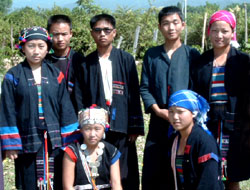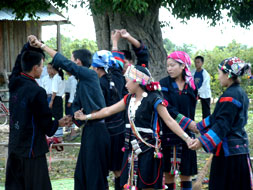| Background | |
| Hmong | |
| Khmu | |
| Yao | |
| Lahu | |
| Akha | |
| Stories | |
| Schedule | |
| Sponsorship | |
| Contact | |
| Akha team | ||
The Akha theatre team live in Muang
Sing district in Luang Namtha province, with China on its Northern
and Myanmar on its Western border. The team are all students at
the Nam Keo Noy boarding school in Muang Sing town. They live there
during the school year and return to their villages during the holidays
to help with rice planting and harvest. They are familiar with traditional
Akha culture and practices, as well as being aware of the challenges
facing the new urban Akha population. |
||
 |
 |
|
The Akha actors have a long tradition of oral story telling to inspire them, and a large collection of songs and dances to draw on. Their feisty sense of humour brings life to any subject and turns it into an entertaining play. Formed in August 2003, the Akha team have since performed plays for awareness raising on drugs and on village banking to help villagers understand modern systems of managing their money. |
||
| Akha culture | ||
| There are 320000 Akha living in the Mekong
Quadrangle. Their villages are recognisable through their carved wooden
gates, which ward off bad spirits. The Akha live in raised houses,
within which one small room is set aside for paying respect to ancestors.
The focal point of community life is the open ground where the tribe
celebrates its major festivals, especially that of the Giant Swing.
It is also a regular evening meeting place for the village youth,
where girls and boys can chat, sing and dance together. They are animists, with a complex culture related to their agricultural practices and many rituals governing their everyday lives. Akha women traditionally wear their wealth on their heads and bodies in the form of silver coins. This makes their black, red and blue clothing look very beautiful and dramatic. No longer producing opium in the mountains, the Akha are finding it difficult to survive without the cash crop which carried them through lean years when the rice harvest was poor. Now is a time of decision for the Akha to try to find a way of maintaining their village communities in the hills or to attempt to make a new life in the lowlands. |
||